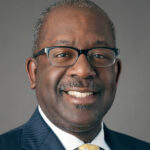Summary:
Kevin’s experience speaking to crowds, multiple organizations, and small teams has led him to a few key takeaways: understand your audience, and keep the message simple.
Thuy

Kevin Washington
Thuy

Kevin Washington
Thuy

Kevin Washington
Thuy

Kevin’s experience speaking to crowds, multiple organizations, and small teams has led him to a few key takeaways: understand your audience, and keep the message simple.



